On the grey stones of Parliament’s grounds stands a woman dressed in black.
From her hand hangs a thick black cord with a white cloth balled at the end and as she shakes the chord a puff of white dust is released from the poi towards the ground.
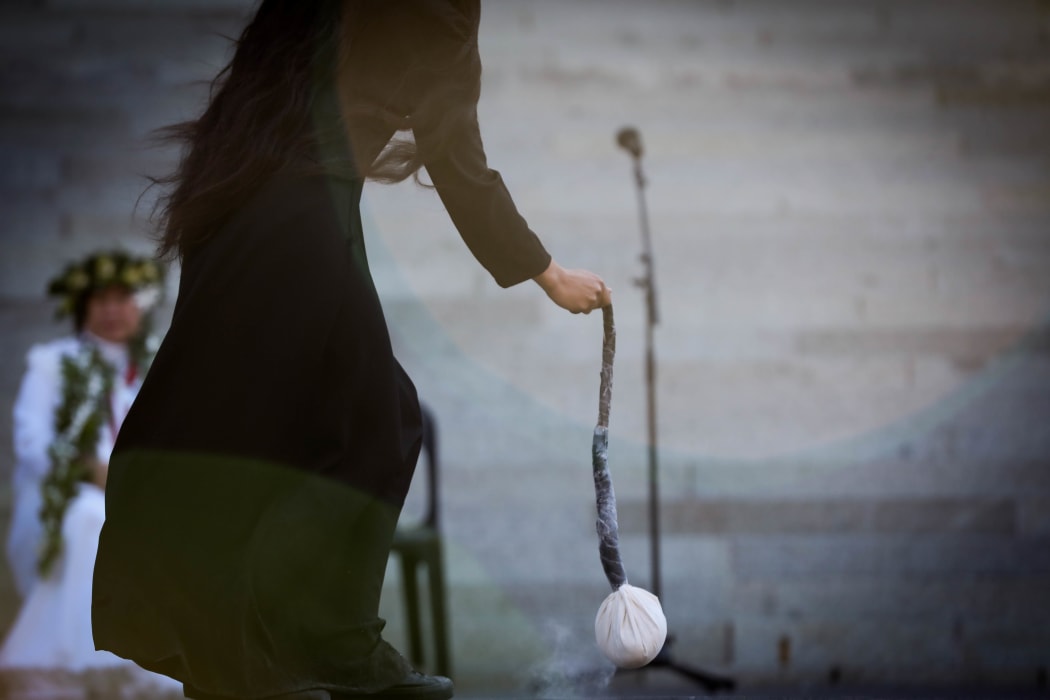
Mau-Wahine Company commemorates the 125th anniversary of Women's right to vote in New Zealand at Parliament. Photo: VNP / Daniela Maoate-Cox
To her right, six more women dressed in black walk towards the Beehive to join her.
It’s a performance from Mau-Wahine called Mausina and it combines te reo and pasifika languages to express women’s adaptiveness, resilience, genealogy, family, and the potency of female existence.
It’s no mistake that it is performed on the 125th anniversary of women gaining the right to vote in New Zealand when the ‘potency of female existence’ is at the forefront of most discussions, including in the House.
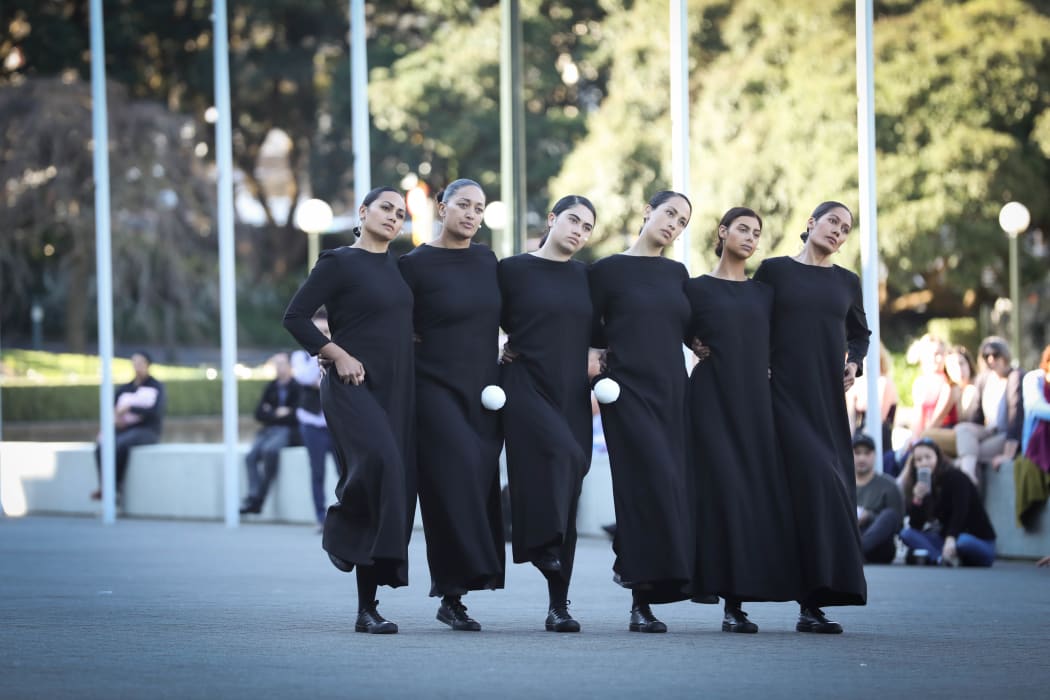
Mau Wahine Company commemorates the 125th anniversary of women's right to vote in New Zealand. Photo: VNP / Daniela Maoate-Cox
On the 19 September 1893, the Electoral Bill was signed into law and among the hundred-odd clauses was one extending the franchise of electing members of Parliament to women.
Then 125 years later, Prime Minister Jacinda Ardern moved a motion to recognise the work of the suffragists - a motion is essentially a request to acknowledge or talk about something.
“My words today are intended primarily as a tribute—first and foremost as a tribute to the women who led the change,” she said.
“To Kate Sheppard; to Margaret Seabright; to the 25,000 women who signed the petition in 1893; to the women who were the first, 40 years later, to enter into Parliament; to the first Māori women; the first woman in Cabinet; the first female Prime Minister; the first MP who gave birth; the first MP who breastfed in this House—I acknowledge every single trailblazer who has led the way for women in this place."
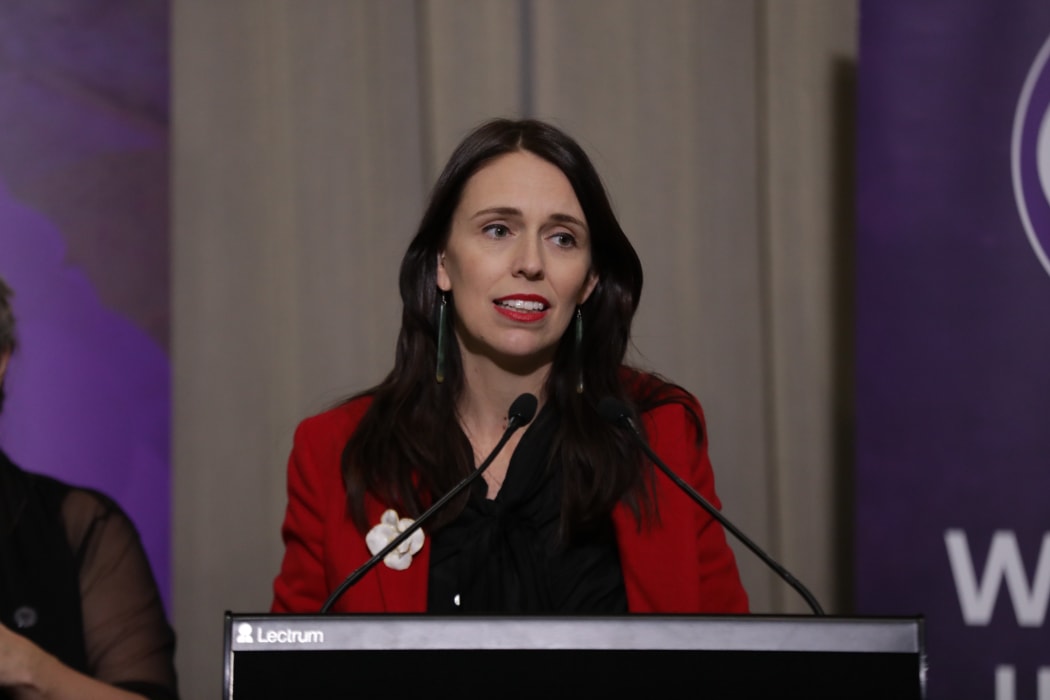
Prime Minister Jacinda Ardern at the Parliament suffrage event. Photo: RNZ / Rebekah Parsons-King
But Ms Ardern also questioned how much progress had been made since 1893.
“We have to ask ourselves: what has it got us? It's got us all of these wāhine toa in this House, it's got us three female Prime Ministers, but is that enough?” she said.
“Our young women may no longer question whether society will accept them in Parliament, but they may very well question whether Parliament is something they will accept if it's where they want to be.”
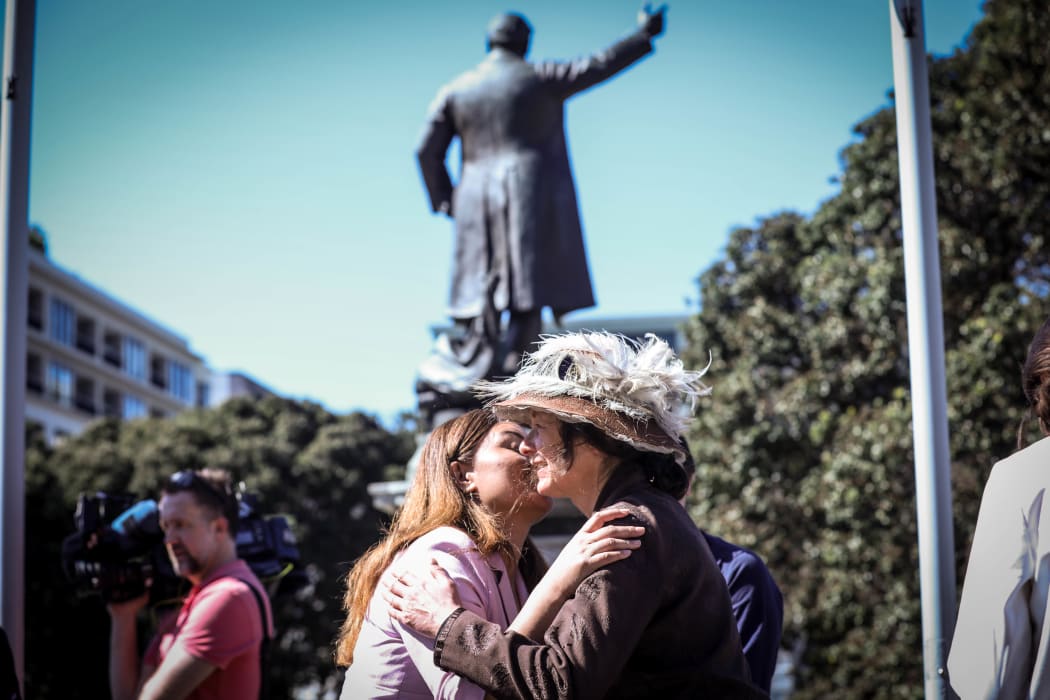
Green Party co-leader Marama Davidson greets a Suffrage Day petition re-enacter in front of a statue of Premier Richard Seddon who opposed women's suffrage Photo: VNP / Daniela Maoate-Cox
Parliament is not an attractive place to work for both men and women, Ms Ardern said.
“Measures of success aren't based on how many constituents you've helped but how many scalps you've claimed. It's not about the policies you've progressed but the amount of gotcha moments you managed or dodged.”
About 40 percent of New Zealand’s Parliament is women and one of those on the opposite side of the house rose to share her experience of first standing to become an MP.
“I recall very vividly standing for selection and being told quite explicitly that they wouldn't vote for me because what sort of mother would I be to my children if I was in Wellington doing this job—how could I be a good mother and do this job?,” National MP Amy Adams said.
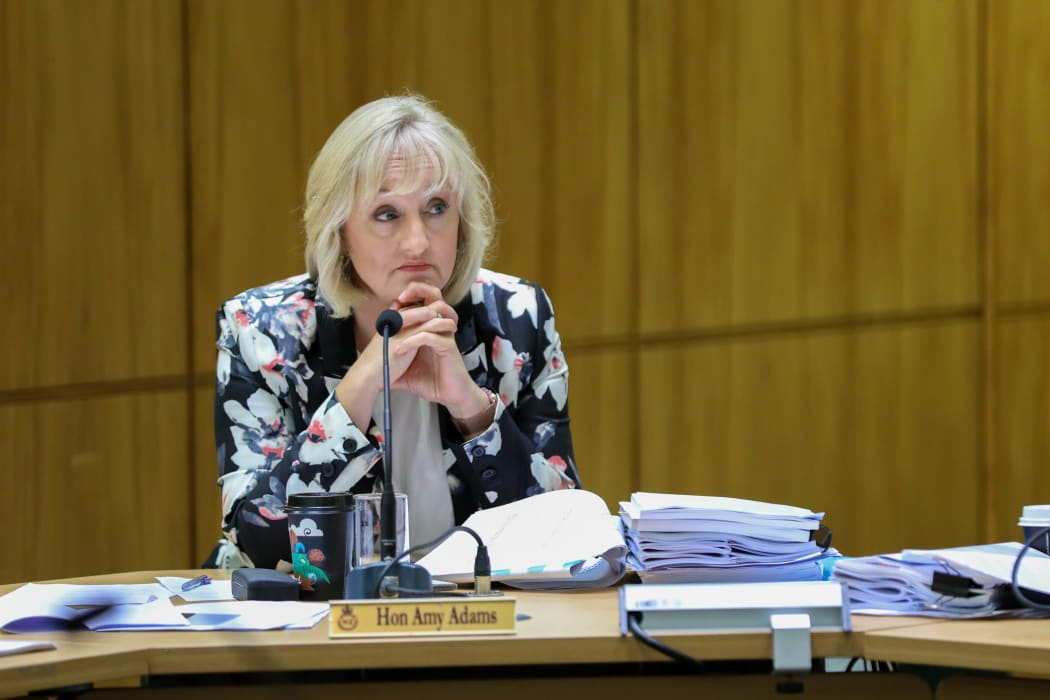
National Party MP Amy Adams in Select Committee Photo: VNP / Phil Smith
“My response, after picking my jaw up from the floor, was: 'Actually, I'm doing this for my kids.', because we come here very definitely with an eye on how we make it better for the generations after us.”
New Zealand First MP Tracey Martin said she also had to field questions about being a mother and an MP when she was first elected.
“I asked the gentleman what Mark Mitchell had said, because I said, 'Mark Mitchell's got a bigger house than me and he's got more children'," she said.
“But there was silence on the end of the phone because I don't believe Mr Mitchell had been asked the same question.”
Earlier in the morning many of the MPs had breakfast in the Grand Hall at Parliament as part of the commemorations for women’s suffrage
All current 48 women Parliamentarians were presented with a gift - a white camellia brooch with a number representing their place out of the 149 women who have been elected to New Zealand’s Parliament so far.
White camellias were given to political supporters of women’s suffrage to wear in their buttonholes while at Parliament back in the 1890s.
Wearing her brooch in the House was women Parliamentarian number 74, National MP Anne Tolley who said the milestone of women’s franchise still had its issues.
“It is good to remember today, marking the passing of the legislation, and also remembering the amendment that was made to it at that time. There was only one amendment and it removed our right to stand for Parliament,” she told the House.
“That wasn't reinserted until 1915, but it wasn't until 1933 that we had the first woman elected."
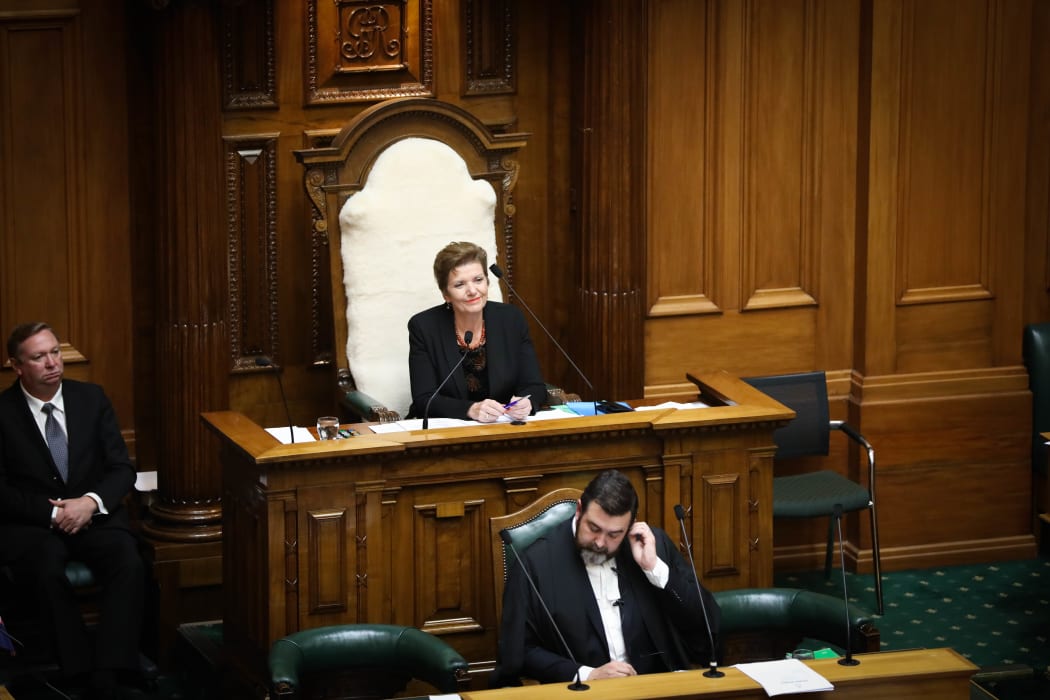
National MP Anne Tolley is the Deputy Speaker of the House. Photo: VNP / Daniela Maoate-Cox
In the 1800s, New Zealand still had two chambers at Parliament, like the House of Commons and House of Lords at Westminster.
Bills enfranchising women had passed the lower house before but failed to pass the final stages in the upper house, or legislative council chamber.
And even those MPs who supported women’s suffrage had attitudes that don’t fit today’s current standards, like Sir Robert Stout.
“I do not deny - I have never denied - that possibly women may be more emotional,” he said during one of the bill’s debates.
“The probability is that their emotions will lead them away before they have studied political questions, and perhaps they may ask the State to interfere more than is prudent in social affairs, but that will correct itself.”
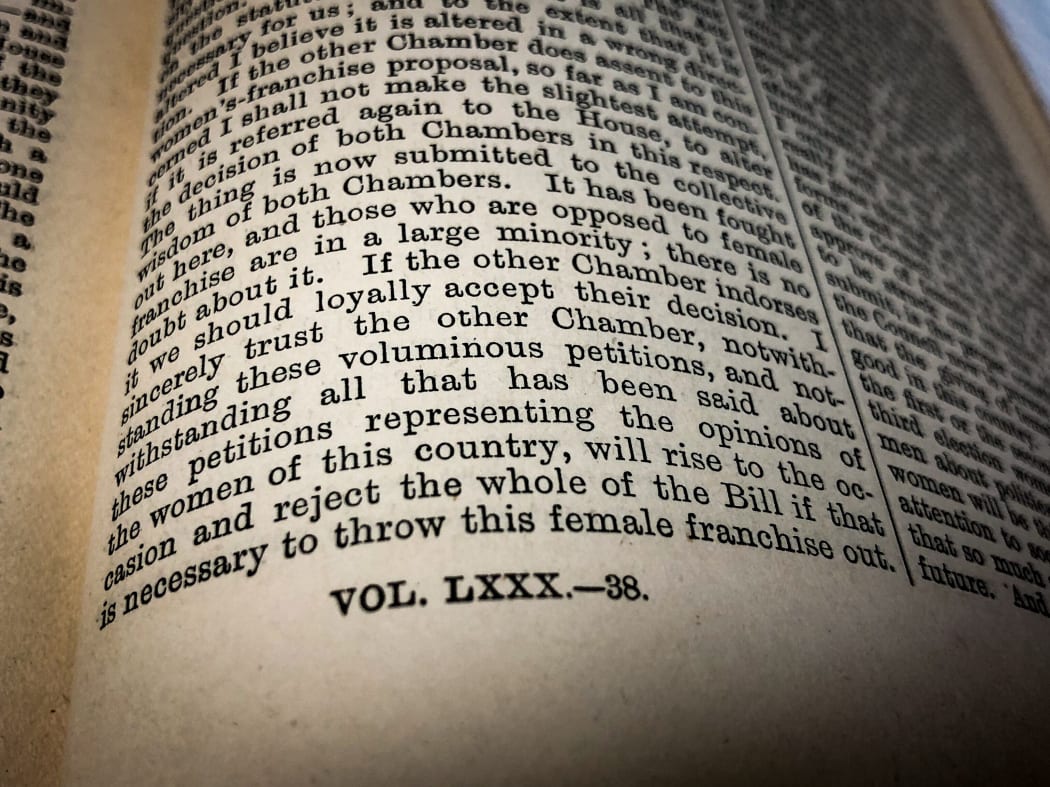
An excerpt from one of the debates on the Electoral Bill which included enfranchising women. Photo: VNP / Daniela Maoate-Cox
And then there were those, such as then Member of Parliament Henry Smith Fish, who were happy to "reject the whole of the bill if that is necessary to throw this female franchise out" or Sir Thomas Mackenzie who thought it was insulting to men who had done a good job representing women's interest in the House so far.
“To say that women have not been represented in this House is to make a statement which is a distinct reflection against the manhood of the colony," Sir Thomas said.
"Why I venture to think that the rights of women are as faithfully represented now, and as honestly, as they will be after they carrying of this franchise.“
This bill almost failed like the ones before it except two members changed their minds in the final stages and voted for it.
While the struggle of suffragists in the past is acknowledged MPs also made it clear that the work for equal rights and representation continues.
“Today is the day that we reflect on that woman who doesn't get the promotion because her male colleague is out there playing golf with the boss,” National MP Nikki Kaye said.
“We reflect on the young woman who doesn't go into engineering or doesn't become a builder because she is discouraged by those males that say 'Don't do that.' We reflect on the woman who is regularly beaten and broken because we have too-high rates of domestic violence in this country.”
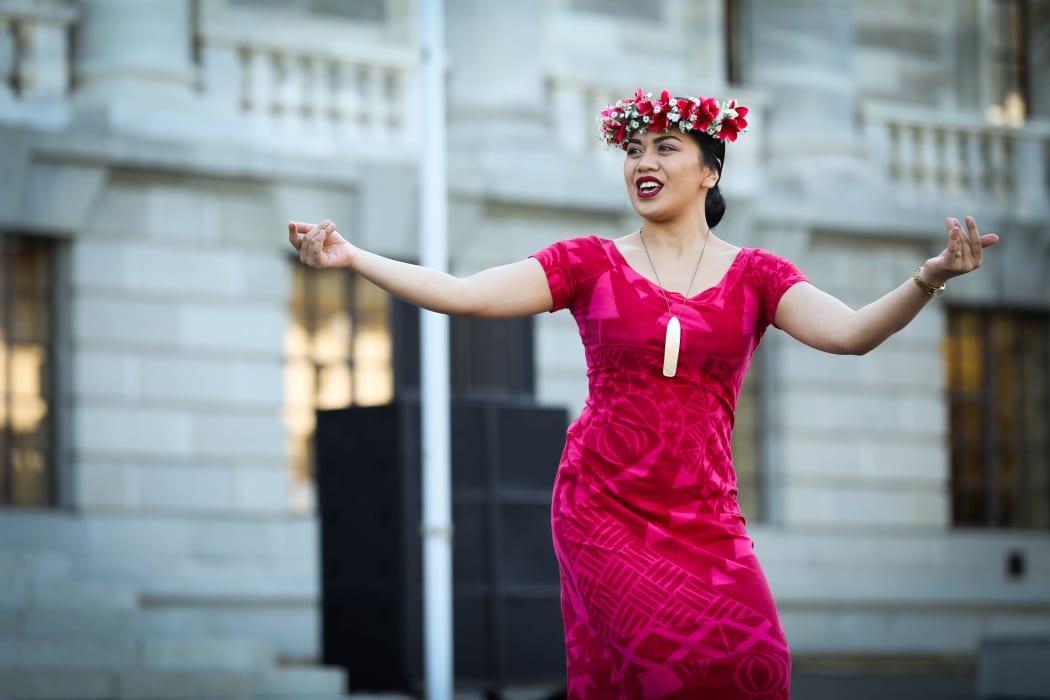
Brienela Tauira from the Cook Islands Community in Porirua dances at Parliament to commemorate the 125th anniversary of women's suffrage in New Zealand. Photo: VNP / Daniela Maoate-Cox
New Zealand has strong connections with its Pacific neighbours and eight of its 120 MPs are of Pacific descent.
Half of the eight are women and Labour MP Carmel Sepuloni said she was only the second Pacific women to be elected to New Zealand’s parliament.
“Māori and Pacific women are more likely to earn less, be in lower-skilled jobs, and are less represented at decision-making tables,” she said.
“So, as we strive towards gender equality, we have to acknowledge that we need to take all women with us to be able to realise gender equality in its true form in this country.”
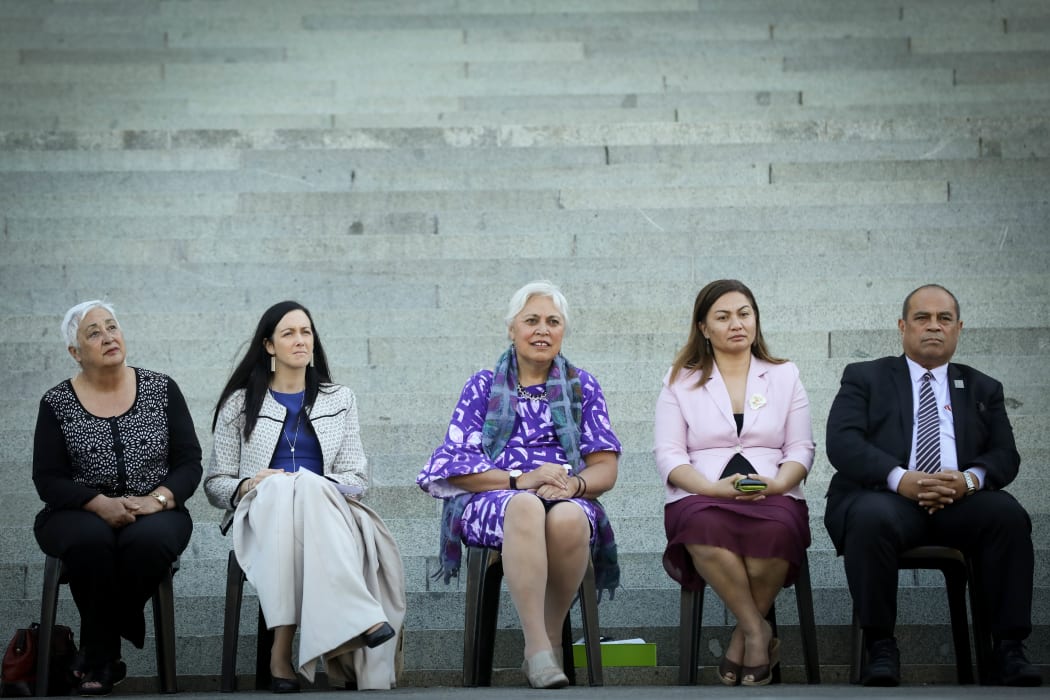
Mausina women's testimony at Parliament to commemorate the 125th anniversary of Women's right to vote in New Zealand. Left to right: Liz Mellish, Jill Day, Luamanuvao Dame Winnie Laban, Marama Davidson, Aupito William Sio. Photo: VNP / Daniela Maoate-Cox
Seated out in front of Parliament House is New Zealand's first Pacific women MP, Luamanuvao Dame Winnie Laban who is listening to the Minister for Pacific Peoples Aupito William Sio echo Carmel Sepuloni to the mix of Pasifika and Maori women watching and participating in the Mausina performance.
“It is welcoming to acknowledge what has happened in 125 years but as we move forward there are still women whose voices we do not hear,” he said.
“I hope those women and men who are in leadership positions will never forget there are many people whose voices we do not hear, whose voices are not heard but who go about their business doing the right thing.”
Read the full speeches from in the House here.
More on Suffrage 125 here: Women, The Vote and Equality


